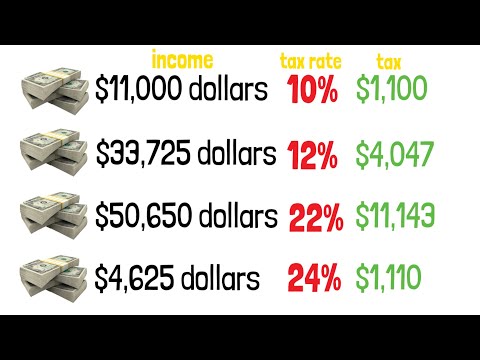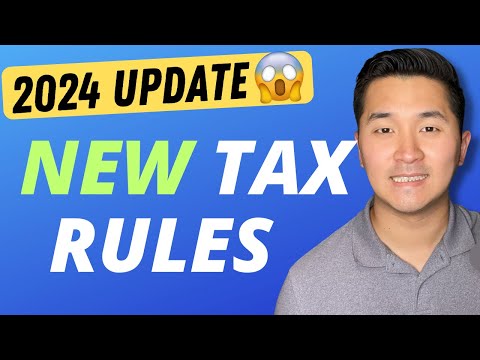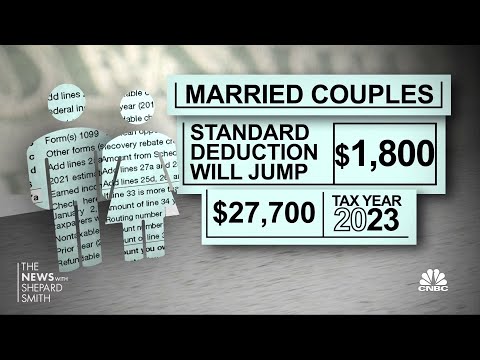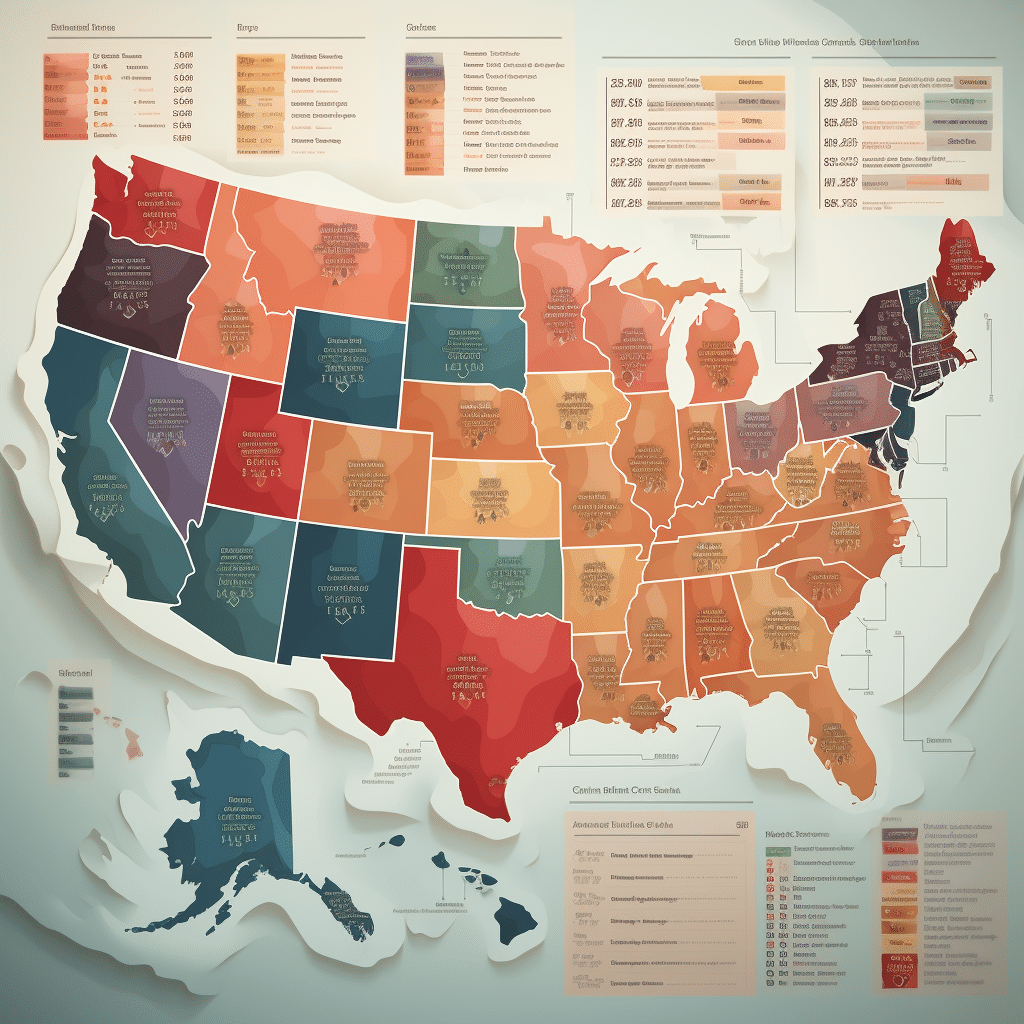The world of taxes can often feel like a maze, with twists and turns at every financial corner. In Illinois, understanding the tax brackets is crucial as it affects everything from your paycheck to your dream home’s mortgage. We’ll dissect the structure, compare it with neighboring states, and offer proactive strategies to maneuver through the landscape of taxes.

Comprehensive Guide to Illinois Tax Brackets

The Structure of Illinois Tax Brackets: Breaking Down the System
Believe it or not, Illinois tax brackets are not as complex as one might think. Illinois operates on a flat tax rate of 4.95%, meaning that no matter if you earn $30,000 or $300,000, the tax slice the state takes from your income pie is the same percentage. This simplicity spares you from the headache of multiple brackets but sparks a robust debate: Is a flat tax fair across the board?
Peering into the pages of Illinois history, the flat tax has been a mainstay but not without opposition. At various times, progressive tax proponents have rallied for tax brackets that scale with income, making higher earners pay a higher percentage. Still, despite its critics, the flat tax stands firm.

| Tax Type | Tax Rate | Description / Notes |
|---|---|---|
| Individual Income Tax | 4.95% Flat Rate | All individual income is taxed at this rate regardless of income level |
| Corporate Income Tax | 9.50% | Applies to the net income of corporations doing business in Illinois |
| State Sales Tax | 6.25% | Statewide rate applied to general merchandise |
| Qualifying Items | 1% | Lower rate applied to qualifying food, drugs, and medical appliances |
| Max Local Sales Tax | 4.75% Max | Maximum additional local sales tax that can be added to the statewide rate |
| Average Combined Sales Tax | 8.82% Average | Typical combined rate when adding state and local sales taxes |
| Example Net Pay $75,000 | $56,282/year or $4,690/month | After an estimated tax deduction of $18,718 out of a $75,000 annual income |
| Example Net Pay $120,000 | $85,353/year or $7,113/month | After an estimated tax deduction of $34,648 out of a $120,000 annual income |
How Illinois Tax Brackets Compare to Neighboring States
Take a hop over the state line, and you’ll find different tax tunes. Indiana, for instance, hums to a flat rate just under Illinois at 3.23%. Wisconsin opts for a progressive melody, with rates scaling from 3.54% to 7.65%. Missouri’s tax crescendo builds from 1.5% up to 5.4%. These disparities can make living on one side of the border versus the other as contrasting as a bustling cityscape to a tranquil prairie in terms of finances.
Consider this: Pitching your tent in Illinois means committing to that steady 4.95% rhythm, regardless of income. But just a stone’s throw away, your tax tune could change. Moving across state lines could hit a different note on your budget.

The Influence of Illinois Tax Brackets on Resident Finances
Let’s put a face to these numbers. If you’re raking in, say, $75,000 a year in Illinois, the taxman cometh for $18,718, leaving you with $56,282 in your pocket. Climb the income ladder to $120,000, and Uncle Sam grabs $34,648, handing you $85,353 to take home.
Now picture this across different income levels — the flat tax paints every taxpayer with the same brush. Opting for the famously intricate financial dance of long-term planning, Illinois taxpayers need to swing to the rhythm of this flat tax rate.

Tax Credits and Deductions Specific to Illinois
Alright, let’s chat about reducing your taxable cha-cha. Illinois sprinkles a variety of tax credits and deductions onto your plate that can effectively whip up a lighter tax bill. These include the Property Tax Credit and the Earned Income Credit, among others, all tailored to lessen the tax burden for eligible Illinoisans.
It’s like looking for beach wedding Dresses; you’ve got to hunt for that perfect fit that’ll have you looking financially fabulous. Get this right, and you could see a significant dip in your tax obligations. Just like finding that ideal attire, finding tax breaks that suit you requires a bit of legwork — but it’s oh so worth it.
Analyzing the “Fair Tax” Amendment’s Impact on Illinois Tax Brackets
Rewind to the 2020 “Fair Tax” amendment, which aimed to overhaul the flat tax with a tiered system. Voters said “no thanks,” and it skidded to a halt. Had it passed, though, this amendment could have been akin to a financial symphony for some and a somber solo for others.
There’s always buzz around what the next tax reform could look like. It exhales fresh dialogues, fanned by the breeze of potential change. It’s a situation that, much like following Phoebe Bridgers music, requires you to avidly tune in for the next development.
Understanding Property Taxes Within Illinois Tax Framework
Dive into property taxes, and you’ll find figures with a different flavor. Illinois doesn’t shy away on this front, often waltzing towards the top end of the charts. Balancing the property tax groove alongside income tax can feel like a delicate dance.
Where does Illinois pirouette in this particular dance? Well, if you’re eyeballing the lowest property tax States, Illinois doesn’t take a bow there. It’s more likely to be found mingling at the other end of the spectrum, according to the scale of States With Highest property tax.
A Look at Sales Taxes and Their Role in the Overall Tax Picture
Sales taxes add another beat to the tax rhythm, meshing with income taxes to contribute to the state’s tune. Illinois sways to the beat of a 6.25% state sales tax rate, keeping a 1% minimal sway for essential items, but reaching up for general merchandise.
This adagio affects consumers across the board. However, like anticipating the year’s Amazon sale, savvy residents monitor and strategically plan for these expenditures, considering the overarching impact on their financial sonata.
Navigating Changes: How Recent Legislative Updates Affect You
Just as sports teams adjust their lineups to optimize performance, recent legislative updates in Illinois might require residents to tweak their financial strategies. Keeping up with these changes can be as crucial as knowing tonight’s Inter Miami vs. Houston Dynamo lineups.
Understanding the latest tax revisions ensures you’re playing the right financial game. It’s not about flipping the board over; it’s about strategic moves that align with the evolving rules. It’s this understanding that provides the compass for navigating the tax landscape.
The Real Impact: Testimonials and Experiences with Illinois Tax Brackets
Nothing brings home the story like hearing it straight from the horse’s mouth. Real Illinois residents open up about getting their wallets trimmed by taxes. From fresh graduates to seasoned workers, every account stitches a unique patch in the Illinois tax tapestry.
Their stories reflect a vivid picture, as diverse as the moving checklist needed for hopping from one state to another. The insight these folks offer goes beyond figures on paper — it’s real life, with all its financial ebb and flow.
Planning Ahead: Strategic Financial Planning in Light of Illinois Tax Brackets
Strategize — that’s the buzzword. Navigating Illinois tax brackets isn’t a whimsical wander; it’s chess, not checkers. Financial advisors with a keen eye on Illinois’ peculiarities dole out bespoke advice to those looking to bolster their economic fortresses.
They advocate for robust financial planning that doesn’t just reactively respond to tax brackets but proactively incorporates them. This ideology is no fledgling thought; it’s the eagle soaring high, with a sharp view of the terrain below.
Conclusion: The Road Forward With Illinois Tax Brackets
To wrap up this journey through Illinois’ tax brackets, it’s evident that this flat rate system colors every financial decision within the state. From personal incomes to the roof over your head, taxes in Illinois demand a respectful nod in every plan you make.
The future of Illinois taxation may hold reform, with debates on flat versus progressive taxes perennially poised at the tip of the legislative pen. As the stage is set for potential changes, residents, equipped with the insights we’ve explored, can waltz forward financially enlightened and ready to tackle whatever tax tune plays next.
Dive into the Ins and Outs of Illinois Tax Brackets
Hey there, are you sitting comfortably? Ready for a shocking revelation about Illinois tax brackets? Prepare for a wild ride through some of the most intriguing tidbits and jaw-dropping facts that are as unexpected as a last-minute goal in a face-off between Inter Miami Vs Houston dynamo Lineups. Let’s kick things off in true Illinois style!
Did You Know? Illinois Tax Brackets Aren’t Soccer Teams, but They’re Just as Competitive!
The Illinois tax system can feel like a competitive sport. Each bracket plays against your income to see how much you’ll owe at the end of the tax season. But don’t worry; it’s not as intense as an Inter Miami vs Houston Dynamo lineups( showdown!
Sign Up for Savings: Cadastro Natura & Tax Breaks
Now, if you thought signing up for a Brazilian beauty brand’s benefits was a good save, wait till you hear about the perks of understanding Illinois tax brackets. Just like getting on board with Cadastro Natura, the more you know, the more you can save! No need for a dazzling front-kick, just a sharp eye on those tax deductions.
The Loop-de-loop of Illinois Tax Brackets
You might think tax brackets are as static as a storefront mannequin, but hold your horses! Illinois tax brackets have as many twists and turns as Chicago’s famous Loop. Watch out for the progressive rates; they’ll take you for a spin faster than the Windy City’s ‘L’ trains. And just when you think you’ve got your Illinois tax calculations down pat, they go and change it up on you! Talk about keeping you on your toes!
Hang onto Your Hat: Surprising Stats
Did you know Illinois tax brackets could fill Soldier Field? Well, not literally! But if each Illinois taxpayer were to take a seat, we’d need a stadium that size just for our tax-paying friends. It’s like the fandom for taxes is as strong as the one for deep-dish pizza—and believe me, that’s saying something!
The Bottom Line: It’s All About the Benjamins
When getting down to the nitty-gritty of Illinois tax brackets, you’re dealing with more numbers than a mathlete’s dream. But don’t let that rattle your brain! It’s essential to understand where you sit in the lineup so you can play the tax game better than the best Inter Miami vs Houston Dynamo lineups.(
And there you have it, folks! A round of applause for tackling the head-scratching world of Illinois tax brackets. By now, you should have a couple of fun party facts up your sleeve and a clearer understanding of how these brackets impact your wallet. So, the next time you’re applying for that Cadastro Natura( discount or cheering on your favorite soccer team, remember that mastering Illinois tax brackets can lead to some significant victories of their own.

What is the Illinois income tax rate for 2023?
Hold onto your wallets, folks! In 2023, Illinois is sticking with a flat income tax rate of 4.95%. That’s right—whether you’re raking in the dough or just getting by, you’re all paying the same rate.
How much is $75000 after taxes in Illinois?
If you’re making $75,000 a year in Illinois, brace yourself for a tax bite. After state and federal taxes, you’re looking at taking home somewhere in the ballpark of $55,000 to $60,000—though this could vary depending on your deductions and tax credits.
What are the federal tax brackets for 2023?
Alright, let’s dive into the federal tax brackets for 2023. They’re a bit of a maze, but here’s the gist: rates range from 10% to 37%, scaling up as your income does. Now, the exact numbers change yearly for inflation, so you’d want to check the latest figures to see where you land.
How much is 120k after taxes in Illinois?
Earning 120 grand a year in Illinois? Not too shabby! But remember, Uncle Sam and the state will want their shares. After deductions, you could see a take-home of roughly $88,000 to $92,000, but it’s smart to crunch those numbers to get the real scoop.
How much is 100k after taxes in Illinois?
Dreaming of that six-figure salary? With $100k in Illinois, you’re looking at netting somewhere between $70,000 and $75,000 after taxes. Not pocket change, for sure, but remembering those pesky taxes, it might not be as much as you’d hoped.
Why is Illinois taxes so high?
So, you’re scratching your head, wondering why Illinois taxes seem sky-high? Well, this state’s got a rep for steep property taxes and a full-on smorgasbord of local taxes. They’re trying to cover massive pension debts and other expenses, which—you guessed it—ends up coming out of our pockets.
How much is 150k a year taxed in Illinois?
Raking in 150 big ones a year in the Land of Lincoln? Be prepared for a decent chunk to go poof come tax time. You could end up with about $110,000 to $115,000 after taxes, but that’s a rough estimate. As always, your mileage may vary!
How much is $300,000 after taxes in Illinois?
Ah, $300,000—the stuff dreams are made of, right? But hold your horses—after Illinois and federal taxes, that dream dips to roughly $210,000 to $220,000, depending on various tax details.
How much is 80000 salary after taxes in Illinois?
Making $80,000 a year in Illinois is nothing to sneeze at, but taxes will take their cut. You might see around $60,000 after the tax man gets his share, give or take some depending on deductions.
How do I know what tax bracket I am in?
Wondering which tax bracket you’re snuggled into? It’s not rocket science, promise! Just peek at your taxable income—that’s after deductions—and match it up with the IRS’s charts. Presto! You’ve got your tax bracket.
At what age is Social Security no longer taxed?
Here’s some good news for the silver-haired crowd—reach a certain age, and Social Security might just get a tax break. Usually, once you hit 65 to 67, based on your birth year, the IRS starts going a bit easier on you. Well, every penny counts, right?
Are tax brackets based on gross income?
Okay, let’s get this straight—tax brackets are all about your gross income, right? Well, sort of. It’s actually your adjusted gross income, after some adjustments and minus those standard or itemized deductions, that determines your bracket.
How much is 200k after taxes in Illinois?
Pulling in 200 large a year in the Prairie State puts you in a sweet spot, but don’t forget about Uncle Sam and his pals. You could take home approximately $140,000 to $150,000 after taxes. Of course, it’s best to run the numbers for your situation.
Is 120k a high salary?
Earning 120k a year might have you feeling like a rock star, but “high salary” is pretty relative. In some places, you’re living large; in others, you’re just getting by. It’s all about location, location, location—and maybe a pinch of lifestyle.
How much is 1 million after taxes in Illinois?
Winning the million-dollar lottery in Illinois? Before you go mansion-shopping, remember taxes will take a hefty slice. You might hold onto about $700,000 when all is said and done, but hey, that’s still seven figures in your bank!
How much is $65000 after taxes in Illinois?
So, you’re pulling in $65,000 in Illinois? After taxes, you could be looking at a take-home pay in the range of $48,000 to $50,000. Not too shabby, but best keep a sharp eye on those deductions to max out your dollars.
How much is 70k after taxes in Illinois?
With $70,000 a year in the Land of Lincoln, you’re doing alright. But post-taxes, you might net somewhere around $52,000 to $54,000. Just goes to show, the taxman always rings twice!
What retirement income is taxable in Illinois?
Good news for you retirees in Illinois: social security and most retirement income are off the hook from state income tax. Though you might still face the tax tunes on the federal level, at least you’ve got one less thing to worry about.
What is the standard deduction for over 65 in 2023?
If you’re over 65 and basking in the golden years, the IRS has a little perk for you. For 2023, the standard deduction gets a nice little bump—it’s like getting an early bird special on your taxes, taking a bit more off your taxable income plate.



